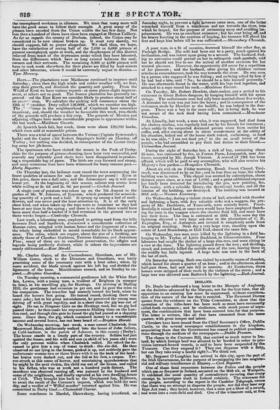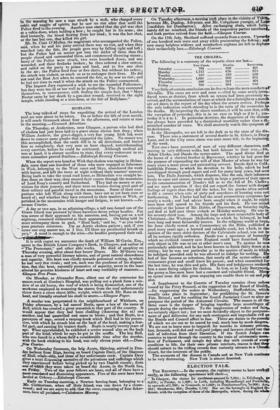IRELAND.
Dr. Doyle has addressed a long letter to-the Marquis of Anglesey, on the doctrine advanced by the IVIarquis, not for the first time, that all opposition to an existing law must be suppressed, without considers. tion of-the-nature of the law that is resisted. The Reverend Doeton quotes from the evidence on the .Tithe Committee, to show that -the operation of the tithe-laws has been such memust have necessarily calledlorth resistance ; and he vindicates, with ,much power of argu. meat, the. combinations that have been entered into for that purpose. The letter is written, like all that have emanated from the same. quarter, with great temper and talent.
Cireulurs have been issued from the Chief Secretary's Office, Dublin Castle, -to the several newspaper -establishments in the 'kingdom, acquainting them that the Government has ceased to publish proolannte tions through the medium of the newspapers.—Dablin Freeman.
The clause in the Customs Bill, that excited:so much terror in Ire- land, bjewhieh foreign beef was allowed to be bonded in order to pro- vision outward-bound vessels is said to have been suspended by the Treasury. Can they suspend it They can dispense with fit duty,1 but can they take away -a lawful right?—'We think not. Mr. Sergeant O'LoughIen has arrived in this city, upon the part of the Irish Government, for the purpose of investigating the late =gists-,
rial and military interference at Blarney.—Cork Reporter. .
One of those fatal rencontres between the -Police and the pople which, apes° frequent in Ireland, occurred on the 20th ult. at Westport.. It exhibited the usual quantity of contradictory sweating that event attempt to. investigate truth in Ireland exhibits. The witnesses for the people, according to the report in the Castle,bar Telegraph,,swore that these was no attempt to disperse the people, nor did they hear any Riot Act read ; they heard, however, that a man got a blow of-esword, and went-into a corn-field and died. One of the witnesses saitle at fiv.e. tira-thrilWanlagte saw a man struck by a mob, who charged every cabin and naggin of spirits, but he saw no riot after that until the Police fired in the evening. Another man stated that the eirl was shot at a cabin-door, when holding a bow ; he caught her in his arms ; she died instantly, the blood flowing from her head ; it was the last shot, or the last but one, that killed the girl. Mr. St. Clair O'Malley, the magistrate who accompanied the Police, said, when he and his party arrived there was no riot, and when they marched into the fair, the people gave way by falling right and left ; but the Police had no sooner got into the midst of them than the people closed and surrounded them, and commenced throwing stones; many of the Police were struck, two were knocked down, and one wounded, and their firelocks broken; he then ordered a slow retreat, and called on the party to prime and load, and to fire one shot in the air; the Police fired four or five shots, but without his orders; the attack was violent, so much so as to endanger their lives. He did not read the Riot Act when he entered the fair, as he saw no riot; and he had not time to read it when the attack on the Police commenced. The Inquest Jury expressed a wish to see the wounded Policemen; but they were too ill or too well to be producible. The Jury contented themselves, in consequence, with finding the simple fact, that "Mary Nestor came by her death by a gun-shot wound, received in the right temple, while standing at a tent-door, at the fair of Ballyhane."



























 Previous page
Previous page